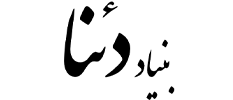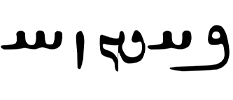ĀfM: āfrīn ī myazd | The Benediction of ritual
Raham Asha
The term myazda is used for the solemn food (and wine) that is redistributed to be consumed by the participants. It first denoted the offering of solid food (meat), and later on the offering of fruits (Pers. bar). The Myazda ceremony is organized in the seasonal festivals, inthe rites of the fourth day, etc.
The Āfrīn ī myazd ‘the benediction of ritual repast’ forms a part of the Myazda ceremony different from the Yasna ceremony. “This Āfrīn has fallen rather into disuse. It is recited rarely. It seems to have been so called because it was recited with the Myazda (the offerings of fruit, flowers, water, milk, etc.) before it.” The Āfrīn ī myazd bears some resemblance with a banquet speech, the Āfrīn ī sūr ; one is pronounced in regular (religious) ceremonies, and the other in occasional festivities.
The text recited is in Pāzand. The extant Pārsīg Āfrīn ī myazd seems to be an attempt at rendering the Pāzand text, and unfortunately it is corrupt at many places.
pārsīg
(1) 1- hamāgzōr hamāg-ašō bēd!
(2) hamāgzōr hamāgnēkīh bēd!
(3) hamāgzōr Ohrmazd ud amehrspendān.
(4) hamāgzōr xvarrah ī dēn ī mazdesnān.
(5) hamāgzōr Ādur Farrōbay ud Ādur Gušnasp ud Ādur Burzēnmihr.
(6) hamāg zōr yašt ābān ud ātašān ud yašt hamāg mēnōg veh.
(7) 2- pērōzgar bād [Ohrmazd ud amehrspendān] vīspān yazdān, abāg xvaršēd ud māh!
(8) az dāmān ī Ohrmazd abāg dāmān ī gētīg az hamāg hušnūd bād!
(9) āfrīn ō dāmān ī gētīg kunād kū hangām ud zamān(ag) nēk bād!
(10) gund ud spāh ī Ērānšahr ped ērīh ud frārōnīh, ped marz ud pāygōs, harv gyāg āyend ud šavend, ped pērōzīh rasend, ped kām!
(11) zad ud škast ud vānīd bād dušmen ī Ērānšahr!
(12) hangad ud abēniyāz ud abēdrōšag ud abēpedyār ud purnēkīh bēd!
(13) ašmāh vehān rāmišn ud abēbīmīh ud nēkīh ped Ērānšahr abzāyād!
(14) mā kāhād ēc dām ud dahišn ī Ohrmazd ped kāmag ī Ohrmazd ud amehrspendān!
(15) bē rasād ēn āfrīn ō tan ī ašmāh vehān frārōn-kunišnān ahlāyīh-varzīdārān!
(16) ašmāh nēk-zīvišn ud dagr-zīvišn bēd, abāg narān ud nārīgān ud pus-zādān ī xvēš abzāyād!
(17) 3- āfrīd bēd cōn Jimšēd!
(18) varzāvand bēd cōn Kay Syāvaxš!
(19) dēnīg bēd cōn Vištāsp šāh!
(20) pērōzgar bēd cōn Frēdōn!
(21) zēnāvand bēd cōn Tahmurup!
(22) pur-xvarrah bēd cōn Kay Husrav!
(23) pur-hunar bēd cōn Ōšnar!
(24) pur-gāv bēd cōn Āsbyān, Frēdōn pid!
(25) pur-asp bēd cōn Purušasp, Zardušt pid!
(26) ašō bēd cōn Zardušt!
(27) kundāg bēd cōn Jāmāsp bidaxš!
(28) dagr-zīvišn bēd cōn Zurvān pādixšāy!
(29) vas-peyvann bēd cōn rōd nāydāg!
(30) vas-hambār bēd cōn zimestān!
(31) huram bēd cōn vahār!
(32) sūd-dahišn bēd cōn Māh!
(33) tēz ud tagīg bēd cōn Mihr!
(34) rōšn bēd cōn ātaš!
(35) abāyišnīg bēd cōn zarr!
(36) ravāg bēd cōn drahm!
(37) kirdār bēd cōn Ohrmazd xvadāy ped dāmān ī xvēš!
(38) šād ud huram ud pur-nēkīh bēd ud ašō ašmā vehān kē ēdar mad ēsted, cē-mān xvān pādixšāyīhā, ud vehān dōšārmīhā, ud kadxvadāy spurrīgīhā dāšt hem. cē sūr stabr, ud xvarišn pāk, ud may xvaš, ud sprahm hubōy, ud menišn abāyišnīg, ud kadxvadāy ham-menišnīg, peristagān tarsāgāh ud menišn avināhgār ud hufrayād.
(39) Ohrmazd kunād kū andar ēn šahr, ēn deh, ēn mān ud mēhan ābād-xīr hāy ud husrav!
(40) 4- hamāg ašō bēd ē ašmāh, nōg nōg, rāy ud xvarrah, pērōzgarīh ud abārīg harv nēkīh-rasišnīh pettāyišnīg mehmān bād!
(41) ašmāh pērōzgarān anōš bēd ud xvaš!
(42) kirbakkar bēd cōn Ardā Fravard!
(43) rād bēd cōn Tištar!
(44) carb bēd cōn vārān!
(45) huram bēd cōn vahār!
(46) vas-hambār bēd cōn zimestān!
(47) ēdōn ašmāh vehān farrox bēd!
(48) ud gēhān buland hēd kū kōf, zufr hēd kū drayā, huzihr hēd kū vargaš, tarr hēd kū vārān, nāmburdār hēd kū yākand ud murvārīd, hubōyag hēd kū marv ī spēd, ud marv ī māhveh(ān), ud marv ī ardašērān.
(49) zad ud škast ud vānīd bād dušmen ī Ērānšahr!
(50) ašmāh vehān ped harv kār frārōnīh ō kām rasēd!
(51) (rasād) bād cōn man āfrīnēnīd!
(52) cē az abestāg pēdāg kū āfrīn dāmān zamīg-pahnāy ud rōd-drahnāy xvaršēd-bālāy ped hamāg gēhān bē rasād!
(53) šād ud huram ud pur-nēkīh ud ašō bēd!
(54) aθa jamyāt yaθa āfrīnāmi.
(66) yaθā ahū vairyō (do).
(56) aṣəm vohū (do).
(57) ahmāi raēsca … dā … hazaŋrəm … dā … kərəbā mazda.
(58) aṣəm vohū (ēk).
English
(1) 1- Be you hamāgzōr with all the righteous.
(2) Be you hamāgzōr with all the good.
(3) Be you hamāgzōr with Ahura Mazdā and the Amǝṣ̌a Spǝṇta.
(4) Be you hamāgzōr with the Fortune of the Mazdayasnian Religion.
(5) Be you hamāgzōr with the fire Farrōbay, the fire Gušnasp and the fire Burzēnmihr.
(6) Be you hamāgzōr with all the consecrated waters and fires and all the good, consecrated spirits.
(7) 2- Victorious be (Ahura Mazdā and the Amǝṣ̌a Spǝṇta), all the Yazata, with the Sun and the Moon.
(8) Pleased be the creations of Ahura Mazdā, with the worldly creatures of all.
(9) Bless the worldly creations so that the time and age be good.
(10) The troops and army of Ērānšahr, who come and go to the boundary and provinces of everywhere, with Aryanity and honesty, may they reach triumph at will!
(11) Be smashed, defeated and vanquished the enemies of Ērānšahr!
(12) Be you opulent, needless, without bad signs, without adversaries and all good.
(13) May you good ones increase the pleasure, security and goodness in Ērānšahr.
(14) May no creature and creation of Ahura Mazdā decrease the will of Ahura Mazdā and the Amǝṣ̌a Spǝṇta.
(15) May this blessing reach yourselves, you good, honest-behaving and right-doing ones.
(16) May you be good-living and long-living, with your husbands and wives and increase your offspring.
(17) 3- Be blessed like Yima Xšaēta!
(18) Be miraculous like Kavi Syāvaršan!
(19) Be religious like the king Vištāspa!
(20) Be triumphant like Θraētaona!
(21) Be vigilant like Taxma Urupi!
(22) Be fortunate like Kavi Haosravah!
(23) Be virtuous like Aošnara!
(24) Be owning many cattle like Āθβya, Θraētaona’s father!
(25) Be owning many horses like Pourušaspa, Zaraθuštra’s father!
(26) Be righteous like Zaraθuštra!
(27) Be a seer like Jāmāspa, the chancellor!
(28) Be long-living like the sovereign Zrvan!
(29) Be much-connected like a deep river!
(30) Be rich in stores like winter!
(31) Be merry like spring!
(32) Be beneficent like the Moon!
(33) Be swift and valiant like Miθra!
(34) Be bright like fire!
(35) Be desirable like gold!
(36) Be current (in the world) like drachmas!
(37) Be active (in ceremonial action) like the Lord Ahura Mazdā unto His own creations!
(38) Be happy, merry, full of good and righteous, you good ones who have come here, for our table is held sovereignly, our guests lovingly and our host perfectly! For the feast is great, the food is good, the wine is pleasant, the basil is fragrant, the thought is desirable, the host harmonious, the servants respectful and the thought harmless and well-assisting.
(39) May Ahura Mazdā do so that in this empire, in this country, in this house and homestead, you be prospering and of good fame!
(40) 4- May be guests to all of the righteous, that is you, riches and fortune, triumph and all other long-lasting coming of good ever afresh.
(41) May you victorious ones be immortal and good!
(42) Be you pious like the truthful Fravaṣ̌i!
(43) Be you generous like Tištrya!
(44) Be you mild like rain!
(45) Be you merry like spring!
(46) Be you rich in stores like winter!
(47) …
(48) Be you good ones thus blessed, tall as the world like mountains, deep like the sea, beautiful like the Vourukaṣ̌a (sea), fresh like the rain, famed like ruby and pearl, fragrant like white marv (39) (marrubium?), marv of Māhveh, and marv of Ardašēr (mugwort).
(49) Be smashed, defeated and vanquished the enemies of Ērānšahr!
(50) May you good ones attain your wish in all honest works!
(51) May this blessing reach you like the wind!
(52) For it is manifest in the Avesta that: Blessed be the creations, (a blessing) in the width of earth, in the length of river, and in the height of sun, to all the creatures.
(53) Be happy, merry, full of good and righteous!
(54) aθa jamyāt yaθa āfrīnāmi… (1x)
(55) yaθā ahū vairyō… (2x)
(56) aṣəm vohū… (2x)
(57) ahmāi raēsca … dā … hazaŋrəm … dā … kərəbā mazda. (1x)
(58) aṣəm vohū… (1x)

